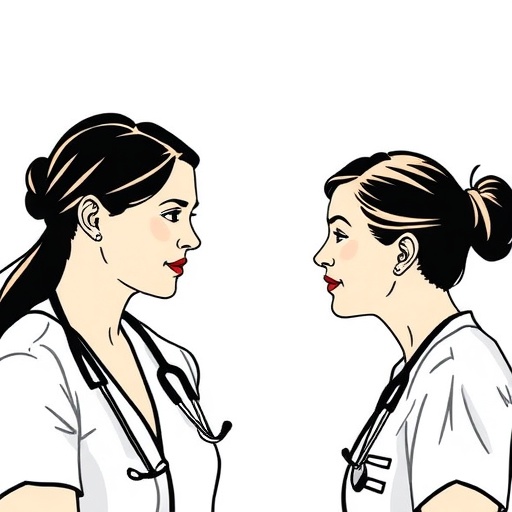In an era characterized by rapid transformations in healthcare and the role of nursing, communication between nurses and patients has emerged as a critical determinant of healthcare quality. A recent study by Yue, Yao, and Zhang closely examines nurses’ attitudes towards this fundamental aspect of care. This hybrid concept analysis delves deeply into the perceptions, beliefs, and behaviors of nurses when it comes to patient communication, highlighting the tension between clinical expertise and the essential human interaction that underpins effective healthcare delivery.
Nurses stand at the frontline of patient care, serving as vital intermediaries between patients and the complexity of healthcare systems. Their ability to communicate effectively can lead to improved patient outcomes, greater patient satisfaction, and enhanced adherence to treatment protocols. However, the intricacies of nursing communication extend far beyond merely exchanging information. They involve an array of emotional, psychological, and sociocultural dimensions that can shape the nurse-patient relationship profoundly.
The study adopts a hybrid approach that synergizes both theoretical and empirical domains, making it pertinent in today’s healthcare landscape. By integrating both perspectives, the authors have uncorked a deeper understanding of how nurses perceive their role in patient communication. This angle not only enriches the existing body of literature but also informs nursing education and training programs designed to enhance communication skills among future nurses.
One of the key findings of this study is the recognition of various barriers that impede effective communication between nurses and patients. Time constraints, heavy workloads, and the ever-present pressure to prioritize clinical tasks often leave nurses struggling to engage meaningfully with their patients. Consequently, the emotional and conversational depth that constitutes good communication can suffer. This is concerning since studies have long shown that effective communication can lower patient anxiety and amplify trust in the healthcare system.
Additionally, the results indicate a significant disparity in communication styles among nurses based on their level of experience and specialized training. Novice nurses often express doubts about their abilities, sometimes defaulting to a more clinical and less empathetic approach. In contrast, veteran nurses tend to be more proficient in navigating complex conversational terrains, exhibiting a greater awareness of patients’ emotional states. This underscores the necessity for mentorship and continued professional development to cultivate communication skills across the nursing workforce.
The study also sheds light on the influence of cultural factors on communication practices. Nurses who work in diverse communities often encounter patients with varying cultural backgrounds, beliefs, and communication preferences. The ability to transcend these cultural barriers is essential, yet it requires nurses to be culturally competent and adaptable in their communication styles. This competency is critical to establishing trust, understanding, and rapport, thereby ultimately improving health outcomes.
Interestingly, the research reveals that nurses’ attitudes towards communication can be shaped by institutional culture. Workplaces that prioritize and foster open communication tend to produce more confident nurses who are better equipped to connect with their patients. Conversely, institutions lacking in such an environment may inadvertently create barriers to effective nurse-patient interactions. This calls for healthcare organizations to re-evaluate their communication policies and the resources available to support their nursing staff.
Moreover, the study notes that the integration of technology in healthcare is reshaping communication dynamics. While tools like electronic health records and telehealth platforms facilitate quick exchanges of information, they can also inhibit the personal connection that is vital in nursing. Nurses must strike a balance between leveraging technology for efficiency and nurturing the human element of care, which forms the bedrock of patient satisfaction.
Another fascinating dimension explored in this analysis is the role of emotional intelligence in nursing communication. Emotional intelligence encompasses the ability to understand and manage one’s own emotions while also empathizing with the emotions of others. The findings reveal that nurses with high emotional intelligence are generally more effective communicators. They are better equipped to handle challenging conversations, such as delivering bad news or addressing patients’ fears, ultimately fostering a more therapeutic environment.
The implications of this study extend beyond the nursing profession. Policymakers and healthcare administrators must take heed of these findings. By promoting an environment that values communication as a core competency, they can vastly improve the patient experience and healthcare outcomes. Strategies such as training programs, peer mentoring, and the incorporation of communication skills into performance evaluations could potentially enhance the overall quality of care.
Additionally, the study reinforces the significance of patient-centered communication approaches. Engaging patients in their care processes empowers them, builds trust, and fosters better adherence to treatment plans. Nurses must be encouraged to adopt a holistic approach where patient preferences and values are integral to every conversation. This shift is pivotal, as it aligns with broader trends towards shared decision-making in healthcare.
As we navigate the complex landscape of modern healthcare, the insights from Yue, Yao, and Zhang’s study underscore the centrality of effective communication in nursing. While the journey towards enhancing communication abilities may face hurdles, it is clear that fostering positive attitudes among nurses can lead to meaningful changes in the way care is delivered. Ultimately, the goal remains the same: to enhance the quality of patient care through improved communication and understanding.
In conclusion, Yue, Yao, and Zhang’s examination of nurses’ attitudes towards communication reveals a multifaceted landscape rife with challenges and opportunities. By comprehensively analyzing the perceptions of nurses, the study not only enhances our understanding of this vital aspect of healthcare but also calls for collective action among educators, administrators, and practitioners. In doing so, it paves the way for a future where effective communication is at the heart of patient-centered care.
Subject of Research: Nurses’ attitudes towards communication with patients
Article Title: Nurses’ attitudes towards communication with patients: a hybrid concept analysis
Article References:
Yue, M., Yao, C., Zhang, Q. et al. Nurses’ attitudes towards communication with patients: a hybrid concept analysis.
BMC Med Educ 25, 1377 (2025). https://doi.org/10.1186/s12909-025-07914-0
Image Credits: AI Generated
DOI: 10.1186/s12909-025-07914-0
Keywords: Nursing, communication, patient care, emotional intelligence, cultural competency, healthcare delivery.




